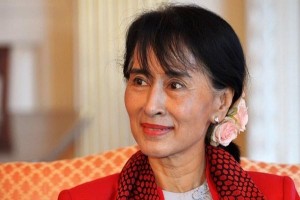Myanmar’s road to peace is a long one
The euphoria and hope created by the election to government of Nobel laureate Aung San Suu Kyi’s National League for Democracy in Myanmar is slowly evaporating.
The party swept to power in November 2015 promising to bring peace to the country’s many ethnic minorities who account for up to 40 per cent of the country’s population.
But fierce fighting between government security forces and ethnic minority militia groups continues unabated.

Aung San Suu Kyi
Just this week fighting has escalated in Myanmar’s western Rakhine state where satellite images appear to show the destruction of hundreds of Rohingya Muslim homes.
And human rights groups have accused the military of murder, rape and the burning of homes of Rohingya, a minority of almost one million people in the largely Buddhist nation.
New York-based Human Rights Watch says it has identified more than 400 destroyed buildings in three districts in the west of the country using satellite imagery.
Human Rights watch says the images show the destruction requires a UN investigation.
Myanmar’s government blames Rohingya extremists who they say have carried out ambushes on troops and police.
Aid organisations and human rights groups have been stopped from visiting the region where it is reported tens of thousands of people have been forced from their homes.
The UN Children’s Fund (UNICEF) said children in the area are suffering high levels of deprivation and malnutrition.
More than 100,000 Rohingya are still living in refugee camps after being driven from their homes by the fighting. In Myanmar they are denied citizenship and other basic rights, despite having lived in the country for generations.
Elsewhere in Myanmar fighting against Kachin, Shan and other ethnic rebel forces in the north are continuing despite peace talks held in August.
More have been displaced recently as the military advances have been supported by helicopter gunships, jets and heavy artillery.
In the Karen state, in the east of country, fighting continues between soldiers from the breakaway Democratic Karen Buddhist Army and the government’s Border Guard Force.
The conflict has seen thousands of villagers driven from their homes.
The ethnic minority Karen had been at war with the Burmese government for 30 years. There are estimated 150,000 Karen living in refugee camps in or on the Thai border.
The Burmese army systematically destroyed Karen villages and in operations described by human rights groups as ethnic cleansing.
Despite this and the continued fighting, arrangements are being made for the first return of Karen refugees who have been living in camps along the Thai-Burma border for up to 20 years having fled fighting between government troops and Karen militia.
Around 90 residents – or 19 families – are set to return this month.
According to the Karen State Government, the returnees are refugees who have voluntarily reported to officials in the camp about wanting to return to Burma.
Myanmar watchers say that a year after the euphoria of the election the reality has set in that the civil war and ethnic and political strife that wreacked the country for so long is still in existence.
Ms Su Kyi has been criticised for failing to speak up for the Rohingya and is seen to be playing a delicate balancing act between her supporters and the military which kept her under house arrest for a decade.
The military still appears to exert a strong influence on affairs despite the country having a civilian government for the first time since the 1960s.
These problems are exacerbated by Myanmar’s bewilderingly complex citizenship laws in which nationality is confined to one of 135 so-called ‘national races’ who were present before the British invaded in 1923.
The laws, created by the military dictatorship in the 1980s, excludes others from full citizenship although there are lower tiers they can apply for.
The laws are administered haphazardly and selectively with endemic corruption adding to the uncertainty for many.
Those who do not fit into one of the ‘national races’ – including Chinese, Indians, Nepalis and Muslims – can wait years to have their citizenship applications processed.
Recently, human rights group The Seagull Foundation surveyed 100 religious and ethnic minorities in the northern city of Mandalay and found almost all had problems obtaining a national registration card.
They reported long, unexplained waits and many were told to change their ethnicity or religion to fit into one of the prescribed categories.
Laurie Nowell
AMES Australia Senior Journalist












